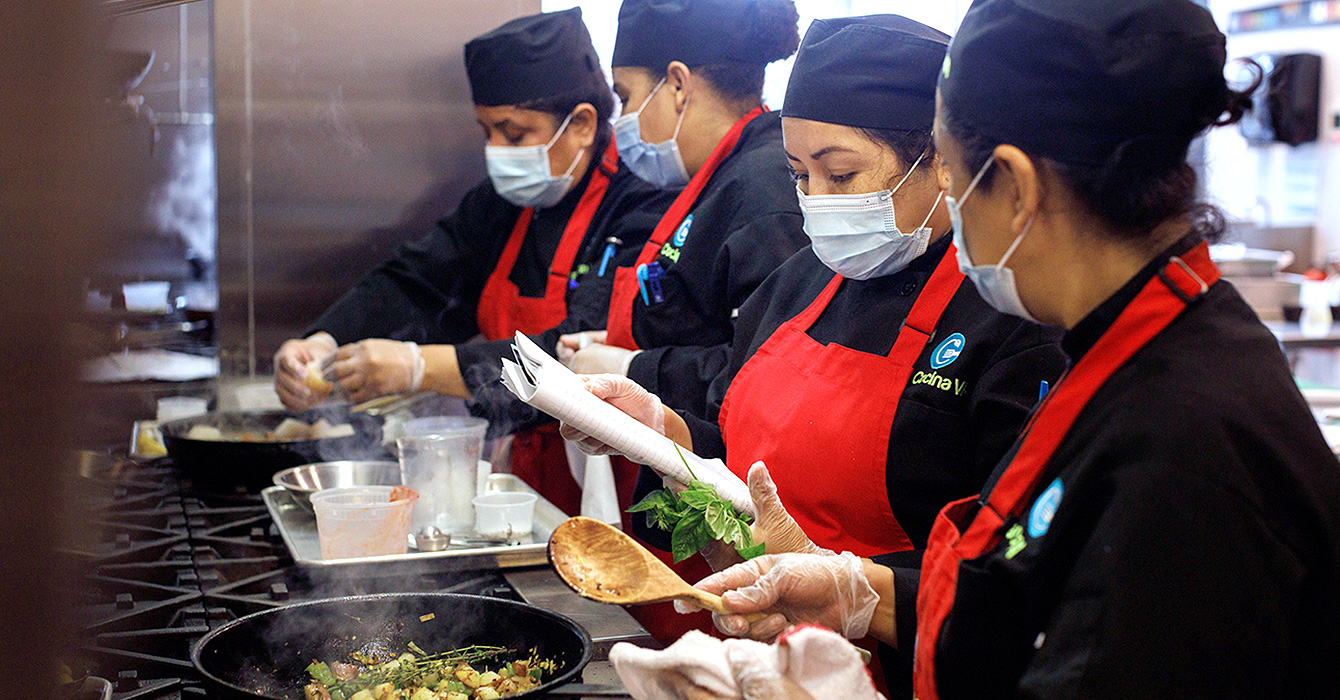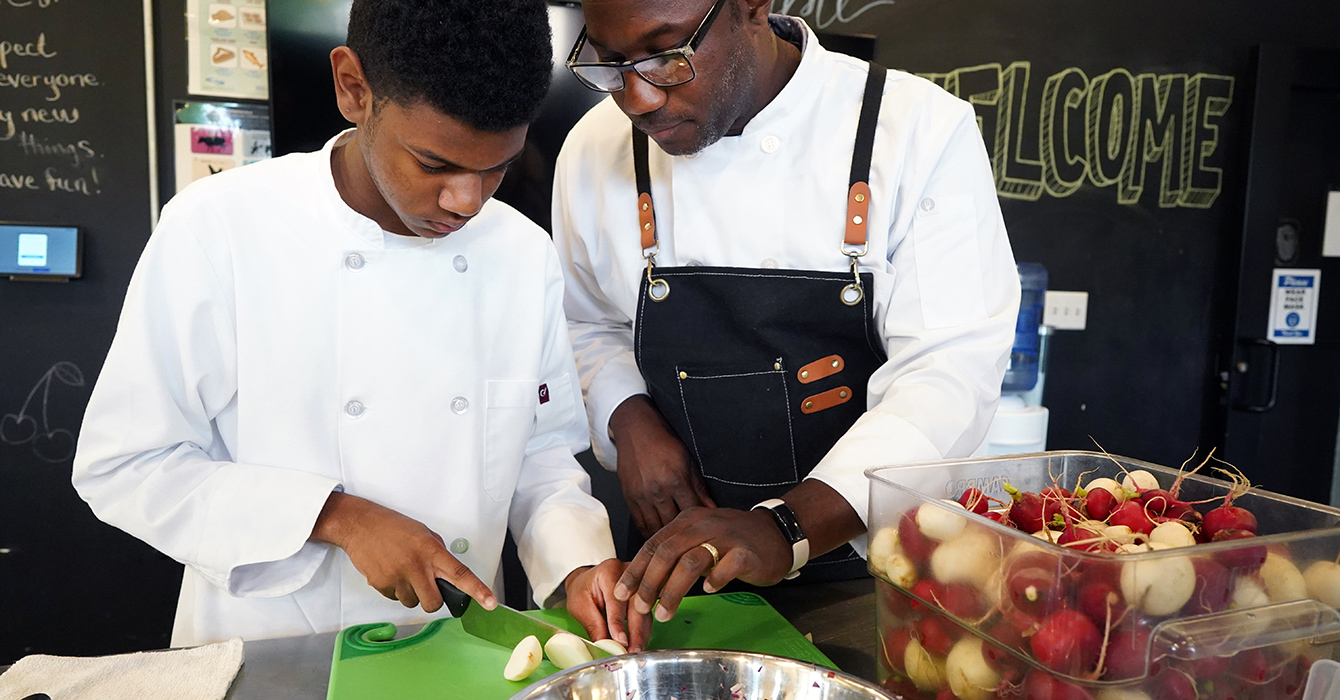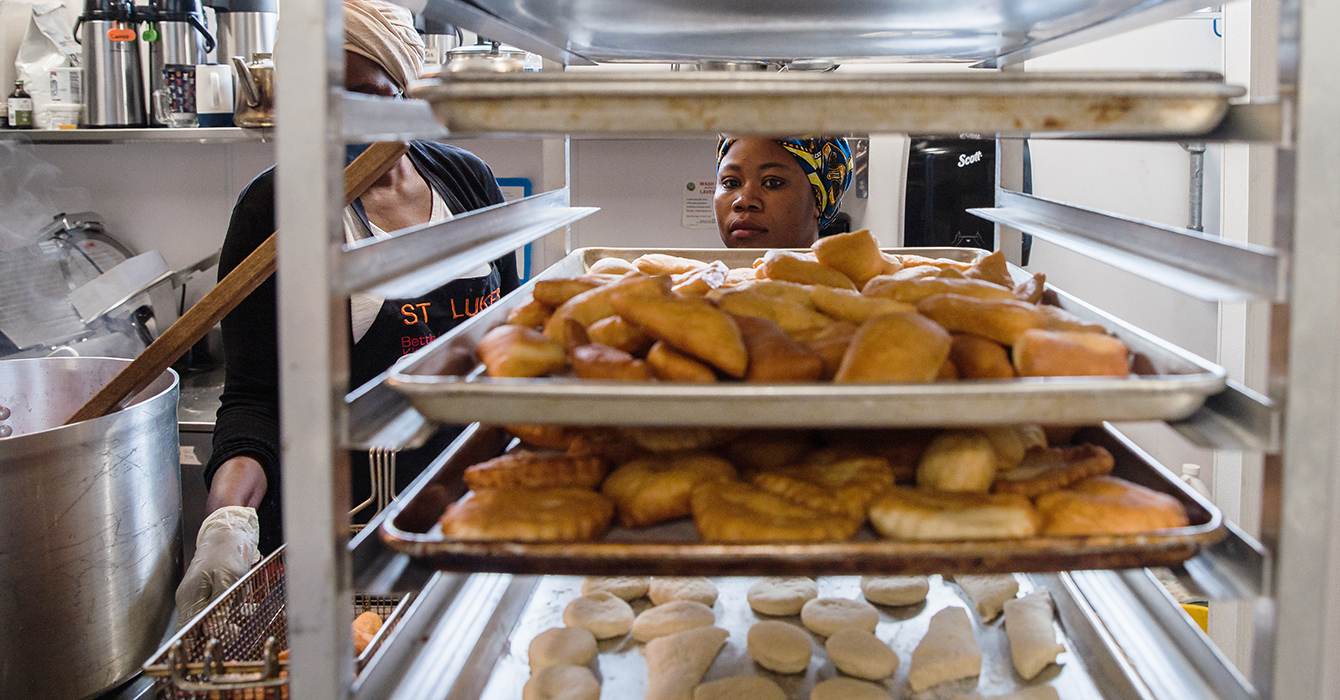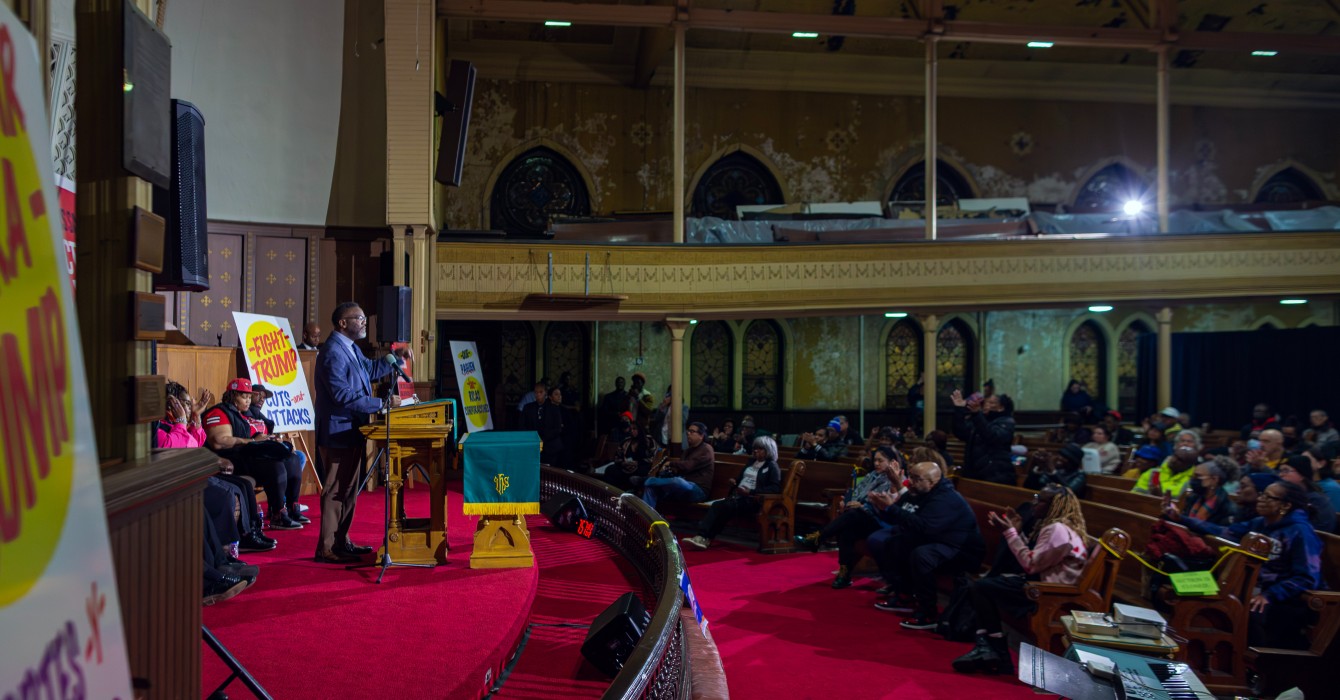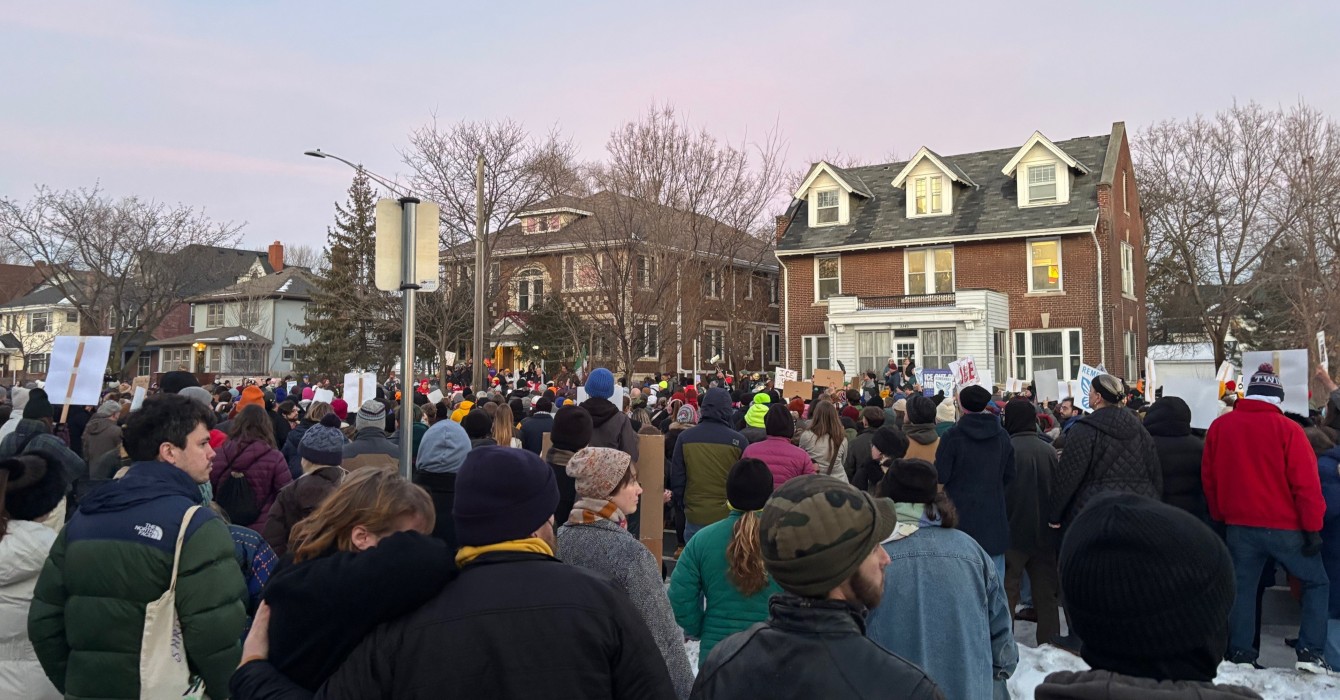The Wilmington Alliance had a plan: in 2019, the Delaware city’s economic revitalization nonprofit would launch a commercial kitchen incubator, helping food entrepreneurs build businesses while utilizing vacant spaces in the city.
Funding was not a problem. But space was. Converting vacant warehouse spaces into full commercial kitchens was a lot more complicated than anticipated. What the project really needed was existing commercial kitchens that were rarely if ever used. Kitchens that could be renovated rather than built from nothing.
Enter Grace United Methodist Church. Built in1865 on what is now the edge of Wilmington’s West Center City and West Side neighborhoods, the active church with a magnificent chapel and historic stained-glass windows is known for its community outreach. At one time, the large kitchen in the basement was used often. But in 2019, it was not.
The idea of using a church kitchen seemed impracticable at first. How would a church share space with a dozen or so entrepreneurs from the community? What were the risks? Was it sustainable?
What are some new ways to view old spaces? How could they be used by people beyond your faith community?
The Rev. Chelsea Spyres was working part time for Grace UMC and Riverfront Ministries in January 2020 when she heard about the project. Riverfront is a young church in Wilmington that meets outside for worship from Easter until the end of October and then in different local spots during the winter. The congregation embodies its practice of song, word and table through community involvement.
“At the time, the Riverfront board was really starting to ask questions like, ‘How do we invest more deeply physically in the city?’” she said. “A big part of Riverfront’s work early on was finding importance and meaning around the communion table.
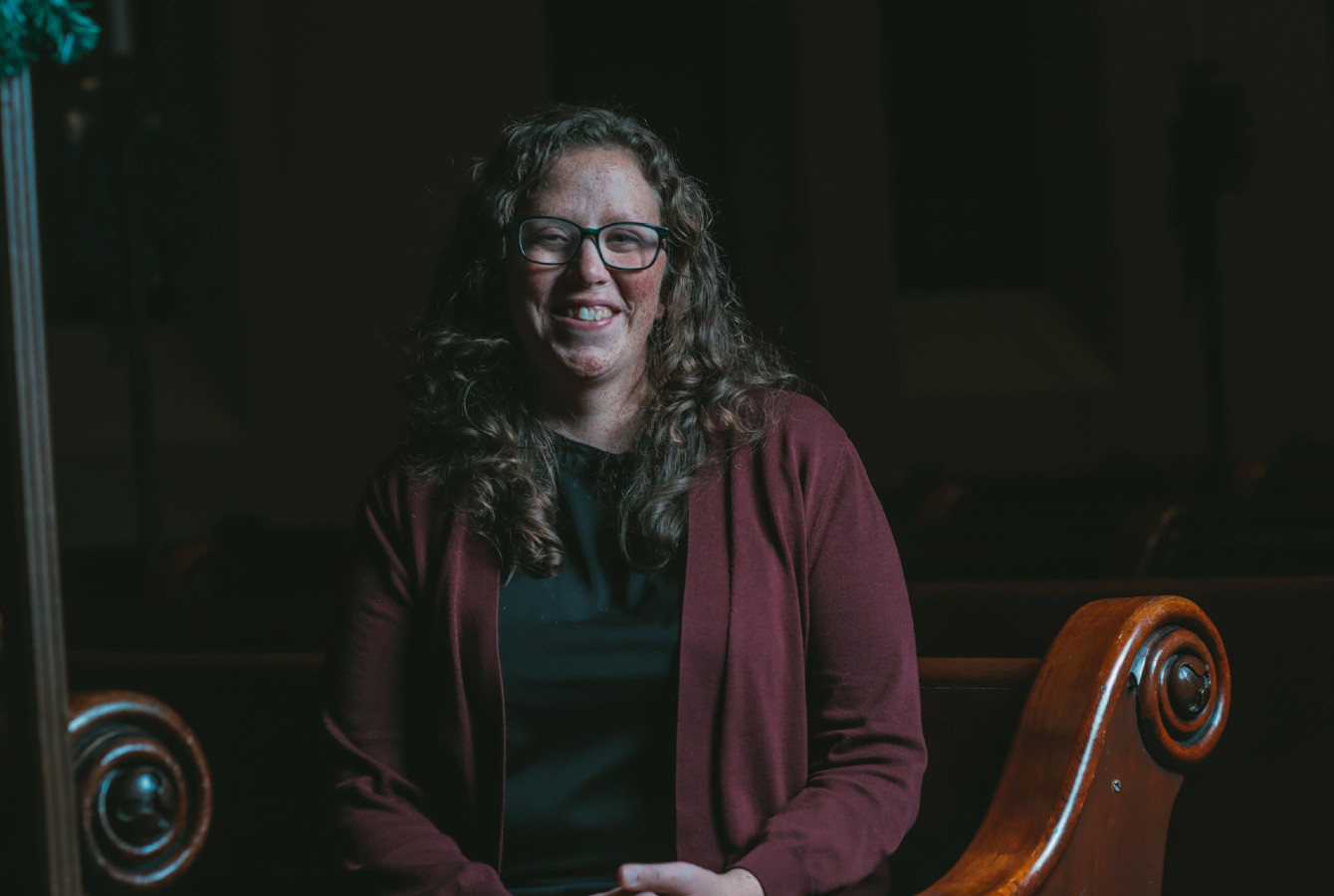
“For Riverfront, the communion table is this reminder of God’s presence with us, of belonging, this reminder of God’s love. But also, we talk a lot about how the communion table calls us to create other tables. To create other spaces of belonging and importance. And so when Grace started thinking about this shared commercial kitchen, Riverfront said, ‘You know, this might be just the right thing for us to be investing in.’”
Today, Spyres is the pastor and executive director of Riverfront Ministries, which is a 501(c)3. Riverfront is the operating partner of the Wilmington Kitchen Collective, leading the work alongside Wilmington Alliance and the church partners. The Collective currently serves 16 entrepreneurs in two renovated church kitchens — the original space in the basement of Grace UMC and a second kitchen at First & Central Presbyterian Church, a few blocks away.
People who don’t have businesses in the food industry may not realize how challenging it is to get one off the ground. Food trucks in Delaware, for example, are required to have access to a commercial kitchen, a barrier that is often insurmountable for entrepreneurs with limited resources. Those facing the biggest barriers tend to be people of color and women, and the Kitchen Collective’s cohort of entrepreneurs reflects that.
What is offered is not simply kitchen access; the Kitchen Collective has a partnership with many local nonprofits, including the Launcher program, a community entrepreneurship course from West End Neighborhood House. Their program with the Collective is specially tailored for food entrepreneurs, focusing on their unique needs in the culinary world.
How are your theological beliefs expressed in your ministry’s engagement with your community?
Fulfilling a need
Joanne Graves has an apiary in her yard, where her husband tends to the bees and collects honey to sell at local farmers markets. Their honey business, GravesYard Apiary, was perfectly legal until Graves decided she wanted to add herbs to create electuaries, sweet medicinal pastes that are mixed with hot water or milk.
“You cannot do that legally unless you’re in a commercial kitchen,” Graves said. “I can sell straight honey, but if I do anything to it, it’s — legally, I have to be in a commercial kitchen.”
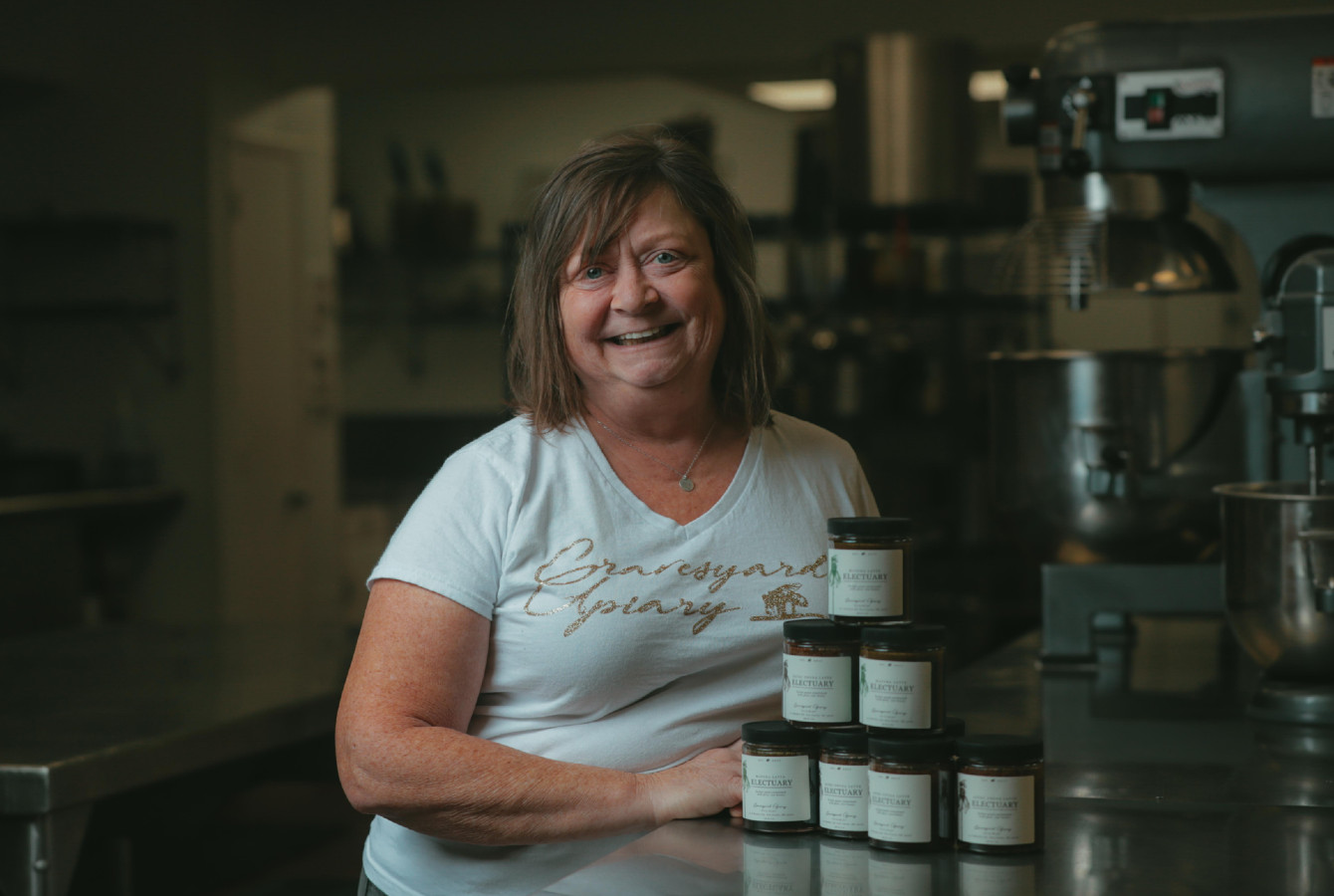
The same is true for the Rhythm + Heat spice blends made by husband-and-wife team Lance and Adrienne Williams.
Inspired by the flavors from her St. Louis background and West Indian heritage, Adrienne adapted her cooking to be flavorful yet low in sodium. The Kitchen Collective not only gives them access to a commercial kitchen space to make the products legally; it also helps guide them through the complexities of business ownership.
“Trying to go through licensure in Delaware, every time you speak to somebody, it’s something different,” Adrienne said. “The team at Wilmington Kitchen Collective has really, really helped us answer questions, get in contact with the FDA, get all of our inspections, so that we feel comfortable to be able to navigate the space of entrepreneurship.”
Currently, Rhythm + Heat spices are sold through their e-store and in Wilmington at Green Box Kitchen, which also serves their Tex-Mex seasoning on its avocado toast.
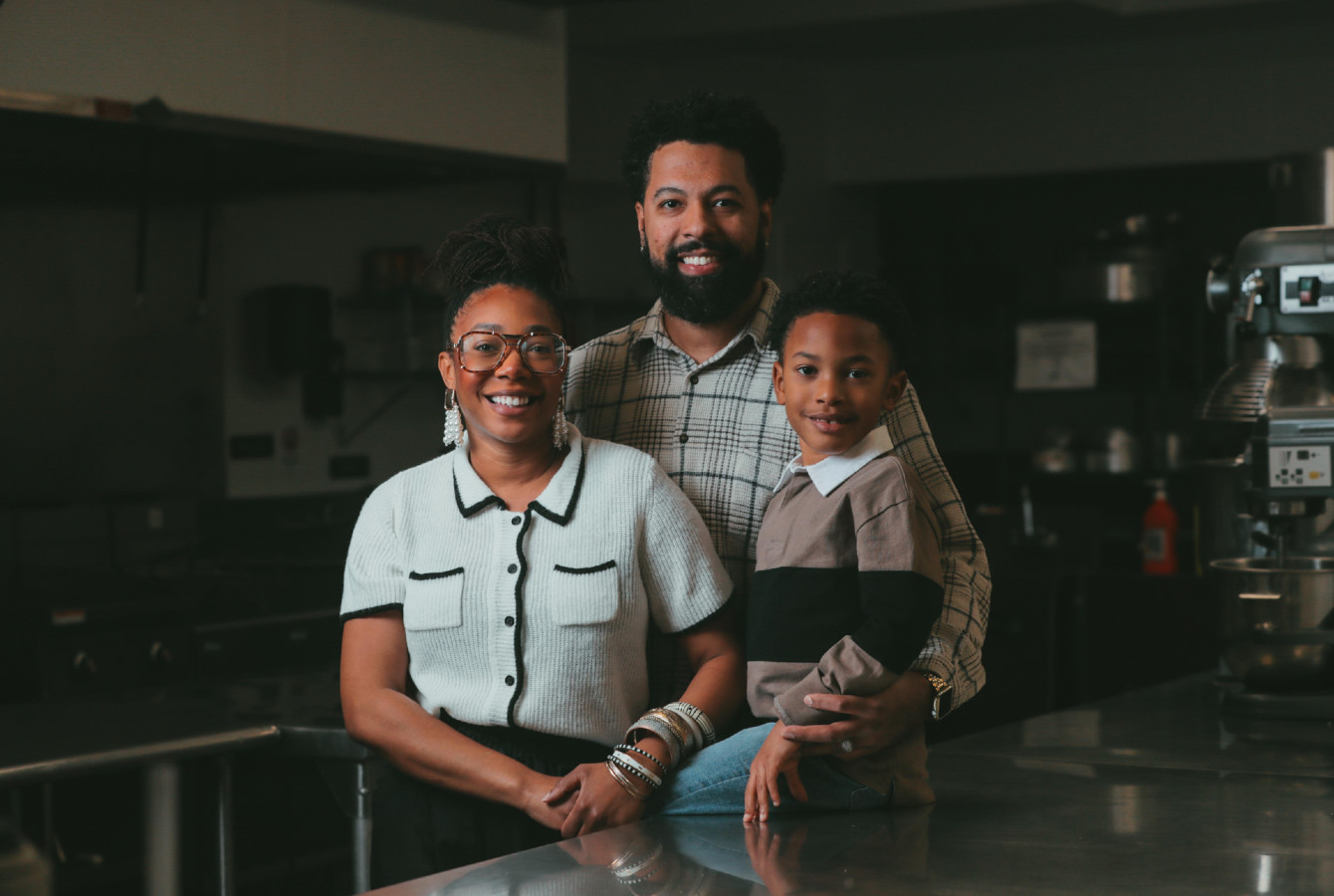
Startup incubation as ministry
Laura Viau, the pastor at First & Central Presbyterian, came there just as negotiations for the Kitchen Collective were being completed, and she immediately saw its value as an extension of her ministry.
“From the get-go, I was super excited about the opportunity to use the kitchen as ministry — you know, an incubator-slash-ministry — because we have the opportunity to host and offer hospitality to the entrepreneurs but then also to get to know them as people,” she said.
And as people, the entrepreneurs bring their own stories. For Monique Outerbridge, the owner of Velvet Cakes by Gwen, baking had helped her through the grieving process after losing her mother, Gwen, in 2005. (Her grandmother Velvet had inspired the now three-generation love of baking.)
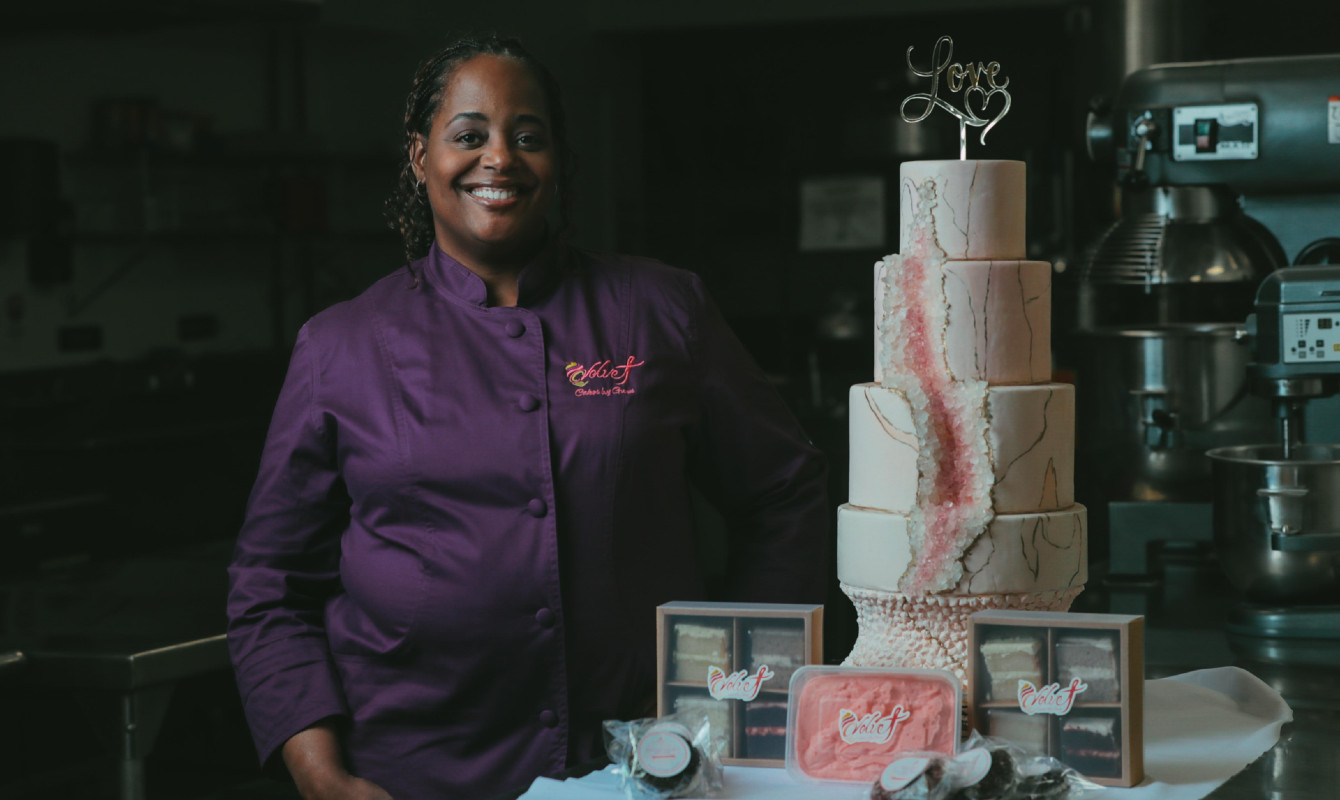
Outerbridge started her company in 2011, and she joined the Kitchen Collective for the opportunity to grow her small business of baking cakes for special events. Since becoming a member, she has been able to connect with local businesses like the Delaware-based coffee shop chain Brew HaHa, which now sells her line of vegan desserts, as well as other Kitchen Collective products, including drinks made with GravesYard Apiary honey. Those business deals were made with the help of the Launcher program.
“It’s really helped me build a sense of community within the city,” Outerbridge said.
The Wilmington Kitchen Collective has a waiting list that has been only slightly alleviated by the launch of the First & Central kitchen. This spring, a third location will launch at Aldersgate United Methodist Church in a northern suburb, the first outside Wilmington’s downtown.
Lisa Bixby, the Collective’s operations manager, and Eric Rayfield, its events and facilities manager, make sure things run smoothly, including identifying pain points in the cohort and tackling them with workshops that are open to both cohort members and the community.
“A lot of our entrepreneurs today have an issue with time management,” Rayfield said, “so we’ve been trying to help them out.”
Rayfield and Bixby have been in the food industry for years, both having owned catering companies.
“I retired in 2017 because my body had had enough,” Bixby said. “I always sort of knew I would go back to work, but it had to be the perfect opportunity. It took five years to find it, but I met Chelsea [Spyres] a couple years ago, and things just transpired, and here I am.”
What gifts does your faith community have that can foster relationships, build networks and impact the community?
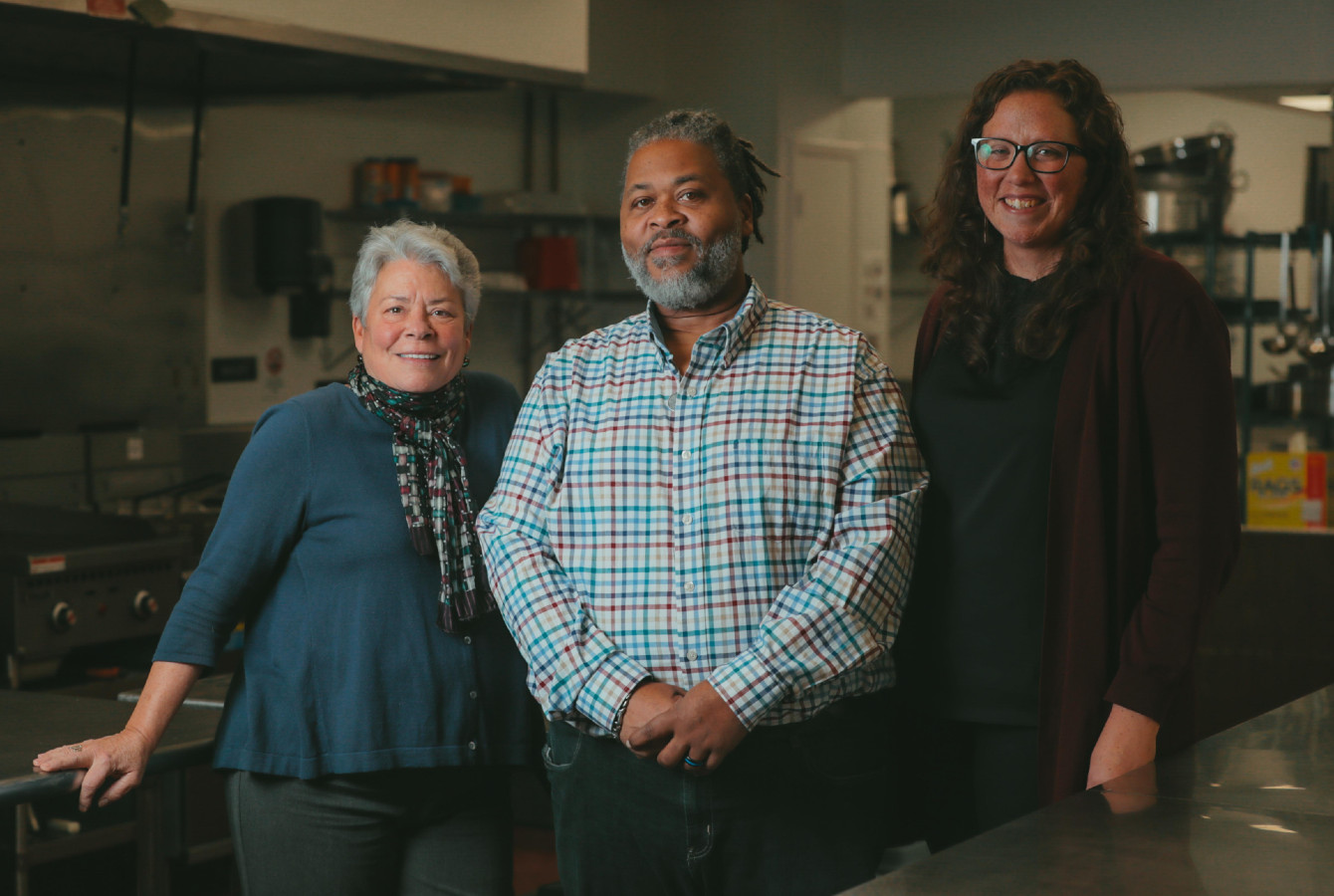
Getting to yes
Running a kitchen incubator inside a church has its challenges. Saturday mornings at First & Central are especially busy in the winter, between entrepreneur activity and the church’s Winter Sanctuary ministry, through which it opens its doors to people who need a place to get warm.
“One of the things that this has given us an opportunity to do as leaders in the church is to think, ‘How do we get to yes?’” Viau said. “How do we find a way to support these folks that we’ve made a commitment to, and have [told], ‘We want you to thrive in your business,’ and take care of our neighbors who are also in need of support? So it’s been a good leadership challenge for us.”
Balancing kindness with business has had an impact on the Kitchen Collective’s entrepreneurs, who have helped build a close-knit, collaborative community.
“When you’re a ‘solopreneur,’ it’s lonely,” Graves said. “There’s nobody to talk to. So it’s nice to be able to meet some really cool people.”
It’s a far cry from the hypercompetitive style of entrepreneurship seen on TV, where building a business is portrayed as a cutthroat game. The Kitchen Collective stands by the idea that community and caring is good for entrepreneurs.
“Early on, it became the foundation for us, of caring about the whole person and their business goals but also caring about how their kids are doing and how their parents are doing — because all of that affects them, and ultimately, it’s going to have an effect on the business,” Spyres said. “From the beginning, we had so many members who said, like, ‘Why do you care? Why are you as a pastor spending all your time building this shared kitchen? I’ve never had a church care about me in this way.’”
Some of the entrepreneurs come to Spyres as a pastor, calling her when they need to talk about what’s going on in their lives. Others, she says, just need to use the kitchen.
“And that’s also OK,” Spyres said.
What innovative opportunity could your ministry explore and implement to express care to people in your community by addressing their challenges? How could you get your congregation to say yes to them?
Questions to consider
- What are some new ways to view old spaces? How could they be used by people beyond your faith community?
- How are your theological beliefs expressed in your ministry’s engagement with your community?
- What gifts does your faith community have that can foster relationships, build networks and impact the community?
- What innovative opportunity could your ministry explore and implement to express care to people in your community by addressing their challenges? How could you get your congregation to say yes to them?



